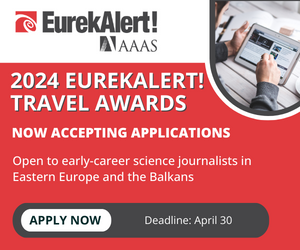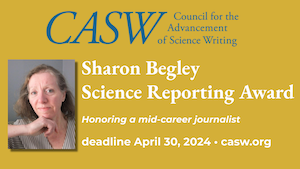Story by Brent Foster
Photography by Brent Foster
The human brain can be frustrating, but there are some tricks to working with (or around) its quirks. Sometimes it takes a village.
At the ScienceWriters2023 national meeting in Colorado, freelance journalists Julian Anna Nowogrodzki and Tara Haelle organized the “Brain Management for Freelancers (But Not Just for Freelancers" (#FreelanceBrain) workshop to discuss the challenges of managing our own unique minds to meet the challenges of life as working writers. After a fast-paced 40-minute back and forth between Nowogrodzki and Haelle, the writers broke out into a brainstorming session to share the tips they’ve learned over their collective years of experience.
“Before we get started, there is a buffet of fidget toys over there on the bar,” said Nowogrodzki, prompting laughter from the audience.
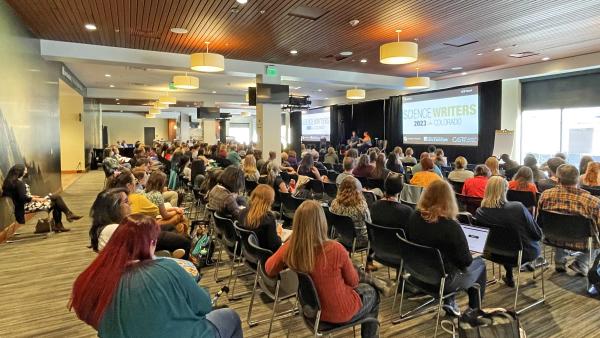 Julian Anna Nowogrodzki and Tara Haelle organized and led the #FreelanceBrain workshop at ScienceWriters2023 in Boulder. (Brent Foster for NASW)
Julian Anna Nowogrodzki and Tara Haelle organized and led the #FreelanceBrain workshop at ScienceWriters2023 in Boulder. (Brent Foster for NASW)
Nowogrodzki’s first question to Haelle highlighted how brain management doesn’t have a one-size-fits-all solution: “What is a commonly recommended tactic that doesn’t work for you?” They discussed the challenges of finding space that is conducive to their individual writing processes, whether a home office or a coffee shop (or in Haelle’s case, three or four coffee shops). For Nowogrodzki, the advice to reward herself for finishing a task hasn’t been that helpful.
“I actually have a lot of trouble not finishing,” she said. “The hard part is starting.” So she flips the script and will sometimes reward herself with jelly beans for every task she manages to start.
One common thread between writers is the little voice in their heads saying they’re not good enough. Nowogrodzki referred to this little voice as “jerk brain.” To offset these negative thoughts, she likes to reframe the situation.
“Sometimes I literally have one on ones with myself,” she said, describing how she puts on her “Julian, the boss” hat and tries to figure out how to help “Julian, the employee” get out of her funk.
When reframing and self-talks aren’t enough, it’s time for outside help with accountability partners. Nowogrodzki and Haelle talked about how that help can be as simple as someone sitting with you as you work through a task or updating a shared Slack channel where co-workers cheer you on with emojis as you check off your to-do list.
“Just knowing other people can see it, even if they’re not actually holding me accountable, is very helpful for me,” said Haelle.
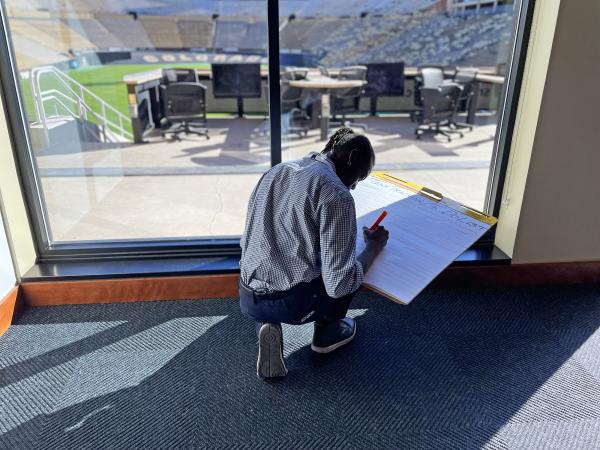 An attendee participates in the advice crowdsourcing activity during the #FreelanceBrain workshop at ScienceWriters2023 in Boulder. (Brent Foster for NASW)
An attendee participates in the advice crowdsourcing activity during the #FreelanceBrain workshop at ScienceWriters2023 in Boulder. (Brent Foster for NASW)
Nowogrodzki and Haelle also shared tips on how to deal with lack of focus.
“I don’t remember things unless they’re written out,” said Nowogrodzki. “My whole brain is externalized.” When focus proves particularly elusive, her to-do list consists of a post-it note with a single task.
Haelle pointed out that brain management methods might work for a while, only to eventually stagnate. It’s apparently quite common, especially for individuals whose flavor of neurodivergence falls under the ADHD spectrum, according to linguist Kirby Conrod.
“I’ve given myself permission to say, ‘Okay, I’m going to keep using this system until it doesn’t work anymore’— and eventually it’s not. And that’s okay,” said Haelle.
The conversation took a tender turn when Nowogrodzki asked about strategies for asking for help. Haelle said the turning point for her was when she went through postpartum depression. At the time, Haelle’s editor, Denise Fulton, noticed she was struggling and eased back on her reporting responsibilities without cutting her out.
“She was amazing,” Haelle said, nearly choking up at the memory. “Just a note to editors out there: If you have the ability to pick up on those things, you create relationships with your reporters where they feel safe sharing things with you.”
Haelle was quick to note that asking for help can be hard, particularly for early career reporters who might not have strong relationships with their editors. But she’s hopeful that those conversations may be easier to have in the aftermath of the COVID-19 pandemic.
“I would like to think that the environment is different,” she said.
The conversation shifted when the panelists gave the science writer audience 15 minutes to brainstorm amongst themselves. Everyone was invited to write their own tips and tricks to specific challenges listed on giant Post-it notes scattered around the Touchdown Club session room.
- Photo captures of crowdsourced advice from the #FreelanceBrain session (PDF | 3 MB)
- Transcribed version of crowdsourced advice from the #FreelanceBrain session (Google Doc)
Nowogrodzki and Haelle finished the session by helping science writers see these challenges in a new framework. Both panelists agreed that grace and self-compassion are vital for managing the science writer brain.
“It’s giving yourself permission to say, ‘Okay, my brain is not letting me do this now.’ And that’s okay,” said Haelle. “And that’s okay.”
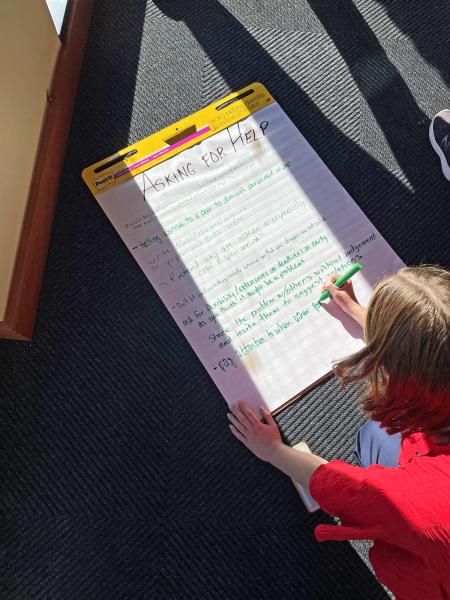 An attendee participates in the advice crowdsourcing activity during the #FreelanceBrain workshop at ScienceWriters2023 in Boulder. (Brent Foster for NASW)
An attendee participates in the advice crowdsourcing activity during the #FreelanceBrain workshop at ScienceWriters2023 in Boulder. (Brent Foster for NASW)
Brent Foster (@_brentmfoster) is a science writer and laboratory technician living in Palm Coast, Fla. Much of his work is devoted to telling the stories of weird critters and the scientists who dedicate their lives to studying them.
PDF compilation file courtesy of NASW member Shel Evergreen. Transcribed version courtesy of NASW member Julian Anna Nowogrodzki.
This ScienceWriters2023 conference coverage article was produced as part of the NASW Conference Support Grant awarded to Foster to attend the ScienceWriters2023 national conference. Find more 2023 conference coverage at www.nasw.org
A co-production of the National Association of Science Writers (NASW), the Council for the Advancement of Science Writing (CASW), University of Colorado Boulder, and the University of Colorado Anschutz Medical Campus, the ScienceWriters2023 national conference featured an online portion Sept. 26-Oct. 3, followed by an in-person portion held in Boulder and Anschutz, Colo., Oct. 6-10. Learn more at www.sciencewriters2023.org and follow the conversation on social media at #SciWri23
Credits: Reporting by Brent Foster; edited by Ben Young Landis. Photography by Brent Foster; edited by Ben Young Landis.

.png)
